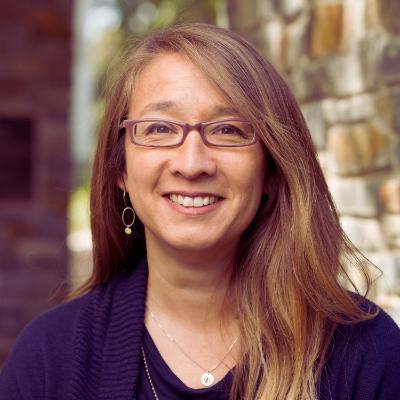
Kyo Yamashiro, Ph.D., took a somewhat circuitous route to higher education and her current position as an assistant professor at LMU School of Education. But through her diverse roles, Yamashiro’s underlying goal has remained constant: bridging the gap between the worlds of research and practice.
That determination has led Yamashiro to co-found and serve as founding executive director of a research-practice partnership (RPP) with the Los Angeles Unified School District (LAUSD). RPPs are a collaboration structured to ensure that research is oriented toward finding solutions for issues of relevance to both practitioners and policymakers. And Yamashiro’s interest in addressing the needs of practitioners and policymakers through research drives her work at LMU. Currently she is involved in a study on the impact of high school ethnic studies courses while continuing to inform the development of RPPs nationally, as co-editor of a special issue of the journal Educational Policy on the social and political dynamics of RPPs.

After completing her master’s degree in education policy and analysis, Yamashiro began working for nonprofit research organizations, including the U.S. Department of Education’s Western Regional Education Laboratory serving California, Arizona, Utah, and Nevada (WestEd). “Those jobs ingrained in me the importance of research and evaluation that responds to constituent needs,” she says. After this and other research jobs, she returned to school for her doctorate to formalize her research skills.
After earning her doctorate, Yamashiro took a policymaking position with the San Diego Unified School District as director of school choice. “Even with my background, having studied charter schools, I found it really difficult to bring research into the policymaking sphere,” she says.
These experiences underscored the divide between the research and practice worlds. “Too often, educational research that’s done sits on a shelf and doesn’t get read by those who need to make real-world decisions,” Yamashiro explains. “In other cases, it doesn’t come out when educators and decision-makers need it—by the time it’s published, the key policy and practice issues have shifted.”
With that in mind, Yamashiro decided to join the burgeoning effort to bridge the gulf between research and practice. In 2010, she co-founded the Los Angeles Education Research Institute (LAERI). Over the next decade, under Yamashiro’s leadership as founding executive director, LAERI raised more than $1.8 million in grants to build the partnership from scratch and to carry out practice- and policy-relevant, rigorous, collaborative research. Since leaving her position as executive director of LAERI, she has continued to serve in an advisory role while conducting RPP-affiliated research projects, raising another $1.7 million with her collaborators to study high school ethnic studies courses.
When LAERI was established, RPPs had been set up in several other cities, but this was the first of its kind in Los Angeles. “An RPP is a sustained relationship, built on trust, in which research is geared toward informing policy and practice improvements that boost equitable conditions for student learning,” Yamashiro says. “The practice partner, such as a school district, helps to identify the questions that are investigated by researchers. And those partners provide feedback throughout the course of the research. Often, we’ll talk through the findings with district leaders, and they will uncover different ways of looking at the data as well as more questions to think about. These conversations improve the research.”
In their research on ethnic studies, Yamashiro and her collaborators are studying the impact of these courses, which typically touch on issues such as identity, structural racism, oppression, and community and civic engagement. It’s an especially timely study, as a growing number of states, districts, and university systems have begun including such courses in graduation requirements. At the same time, groups of citizens across the country have protested the teaching of subjects such as critical race theory, structural racism, and the history of oppression in the U.S. The mixed-methods research project includes teams studying public schools in Los Angeles (led by Yamashiro), San Francisco, and Albuquerque to determine the impact of the courses on a range of academic and social-emotional student outcomes. Teams are also interviewing principals, teachers, and students to learn more about how courses are taught and how students experience them.
“We’re at an important turning point in our public school system, where vitriolic fights are occurring in school board settings and elsewhere about trying to limit or ban what can be taught in classrooms. This is especially the case for topics that touch on disenfranchised populations and historically marginalized communities,” says Yamashiro. “In our study, we’re finding very talented teachers who are deft at addressing complex issues such as these. They are helping their students navigate multiple layers of identity, learn about historical and current sources of systemic discrimination, and develop empathy for others who may be marginalized in different ways.”
High school students are at a critical point in adolescent development, she adds, and to leave such conversations out of a school setting seems short-sighted. “Students need more connection and engagement with school at this age,” Yamashiro says. “As efforts scale up to full implementation across a district, it’s important to learn from these teachers and students about their approaches and perspectives on the value of these courses.” For the studies being carried out in Los Angeles, the research team strives to communicate regularly with LAUSD and to have ongoing dialogue about findings as they emerge.
The special issue of Educational Policy that Yamashiro and her colleagues co-edited highlights the elements of RPPs that remain challenging. One is how the incentive structures of universities and school districts are often at odds. “University faculty are typically recognized and rewarded for publications in peer-reviewed journals, but most practitioners don’t have access to them,” explains Yamashiro. “In RPPs, the currency is the ongoing dialogue on issues as they emerge, and making sense of it together. I’m grateful that through the special issue, we were able to turn attention to some of these political dynamics and institutional barriers that are rarely discussed. And we gave readers open access to as many articles as possible, even if only temporarily, so that practitioner partners could access them. We need to keep improving the systems around RPPs in ways that make them even more effective and equitable.”